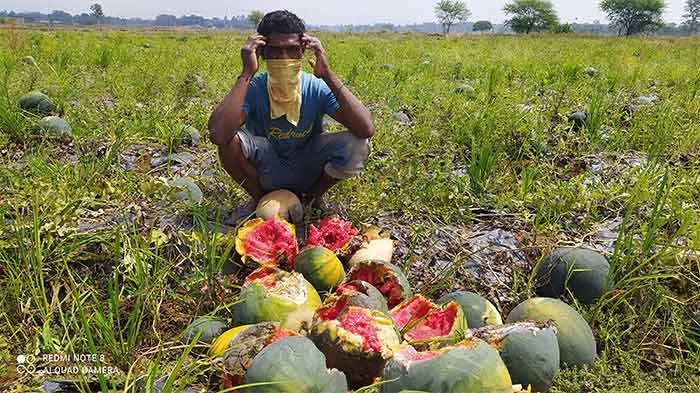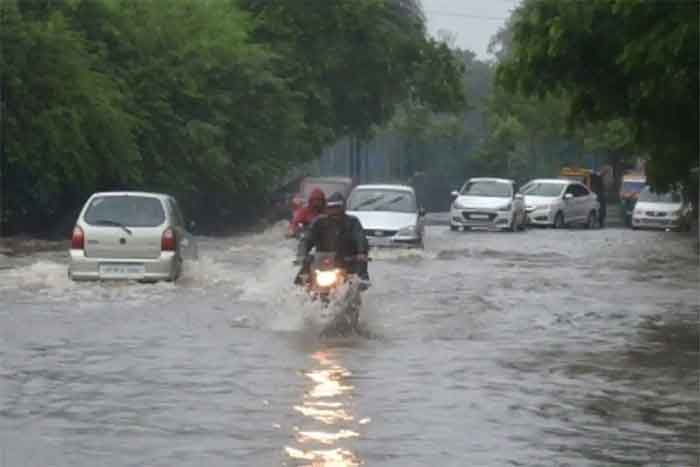With the lockdown scuttling markets and slowing down trade and demand, farmers are letting their produce rot in the fields. They are drowning in debt and unable to plan their next harvest.

Raipur: On June 5, 2021, Dhanush Sahu (58) and his wife Sona Bai (54) of Singhola village in Rajnandgaon district in Chhattisgarh hung themselves to death. “My brother was deep in debt. He was trying hard to get a bank loan to start a fishery in his existing pond. Unable to do so, he had to take this extreme step,” moans Sahu’s brother.
A couple of months earlier, Chotu Ram Kaiwart (58), from Raja -Kapa village in Bilaspur district of the state, had also committed suicide. Harassment by the local patwari (revenue officer) who was pestering Kaiwart for a Rs 5,000 bribe to make available land records for his farmland, had driven the farmer into taking his own life.
Chhattisgarh had the notorious distinction of recording the fifth largest number of farm suicides in the country in 2019, as per statistics made available by the National Crime Records Bureau (NCRB). In 2020, the state accounted for 144 farm suicides.
The plight of vegetable farmers
 Even as the number of paddy cultivators has burgeoned over the past ten years in Chhattisgarh, vegetable cultivation has been catching on too. At the moment, 20 percent of the cultivable land is under vegetable farming, with vegetable farmers comprising 18 percent of the agricultural workforce, according to farmer leader Rajkumar Gupta. The COVID -19 pandemic and resultant lockdowns have hit farmers hard, particularly impacting vegetable farmers, with many reduced to bankruptcy. Unlike paddy, vegetables are not supported by Minimum Support Price (MSP) by the government and prone to wild market fluctuations.
Even as the number of paddy cultivators has burgeoned over the past ten years in Chhattisgarh, vegetable cultivation has been catching on too. At the moment, 20 percent of the cultivable land is under vegetable farming, with vegetable farmers comprising 18 percent of the agricultural workforce, according to farmer leader Rajkumar Gupta. The COVID -19 pandemic and resultant lockdowns have hit farmers hard, particularly impacting vegetable farmers, with many reduced to bankruptcy. Unlike paddy, vegetables are not supported by Minimum Support Price (MSP) by the government and prone to wild market fluctuations.
The recent lockdown, which has been enforced since April to rein in the spate of infections brought in by the second wave of COVID -19, has been extremely harsh on farmers and has broken the back of the rural economy. It has led to the shutdown of markets and vehicles going off the roads, resulting in no business being transacted at all. Vegetables being highly perishable commodities, farmers found themselves in a helpless situation.
Merchants had ceased to lift the produce citing lack of demand. When pressed to do so, they would offer rates lower than the farmers’ input costs.

“I had cultivated watermelon in 8 acres, bitter gourd in 4 acres, tomatoes in 2 acres, ladies finger in 1.5 acres; all my crops are ruined in the absence of a market,” said Shailesh Singh, a farmer from Chalta, Surguja. “I had to leave them rotting in the fields because we could not even earn our input costs.”
Hari Bhoye, a vegetable cultivator from Ambikapur who grew vegetables on four acres of farmland, lamented, “I am now in debt.”
Praveen Chawda, a big vegetable farmer from Durg, cultivated tomatoes, chillies and other vegetables on 600 acres of farmland, at a cost of Rs 12 crore. He has now ended up with an eighty percent loss.” “Farmers like me could neither export their produce nor sell in the local markets,” said Chawda.
The situation is so desperate that in districts like Raigarh, vegetable producers have left their crops for cattle to graze on, social activist Rajesh Tripathi told 101Reporters.
President of the Raipur Wholesale Vegetable Association T Shriniwas Reddy says, “We used to sell vegetables worth Rs 40-45 lakh daily. Business has now come down to Rs 15-20 lakh per day. Very few people are authorised to sell vegetables. Secondly, vegetables have to be sold in retail on hand carts or vehicles.”
Failure to provide farm relief
According to Rajnandgaon farmer leader Sudesh Tikam, the government’s much-publicized Rajiv Gandhi Kisan Nyay Yojana has failed to provide relief to distressed farmers. The government had initially announced an incentive of Rs 10,000 per acre for paddy cultivators to be given in four instalments. But even this was subsequently reduced to Rs 9,000 later, he said.
As activist Jugnu Chandrakar pointed out, “Farmers face a cash crunch even in normal times. How do you expect money paid in instalments to relieve them in these critical times when the prices of fertilisers, seeds, and fuel have zoomed up?” Besides, he noted, “the central government announced its subsidies on Di-Ammonium Phosphate (DAP) fertilizer too late.”
Smallholder farmers and farmers’ organisations, on their part, do not see any hope in crop insurance, mainly since the insurance cover compensates farmers only for natural calamities. Thus, no farmer is compensated for his crops rotting due to the lack of storage facilities post-harvest. Moreover, in the past, owing to faulty claim settlement methods, several farmers have had to settle for just Rs 400-500 per acre in insurance claims. This is much less than the premium they need to pay for insuring their crops.
What experts say
According to Economist JL Bharadwaj, only 20 lakhs of the state’s nearly 37 lakh registered farmers benefit from the state government’s paddy procurement scheme. Besides, more than 30 percent of the farmers in the state are sharecroppers or contract farmers. This prevents them from accessing bank loans, since only original owners of the land are recognised as ‘farmers’ by banks. Sharecroppers, thus, are left with the only option of borrowing money from moneylenders at high rates of interest. When crops fail, the severe financial burden drives them to suicide, explained Bharadwaj.
Agricultural Scientist Sanket Thakur felt, “the government must offer incentives including loan waivers to arrest farm suicides, as is being done to land-owning ‘farmers’. Failing to do so will increase the suffering of farmers, who, in turn, will continue to get sucked into the vicious debt spiral that has spurred farmer suicides and debilitated the rural economy over the years. Until now, the sufferers had largely been growers of cash crops; this time it will include vegetable farmers.”
While agreeing with the above analyses on farm suicides, Chhattisgarh Agriculture Minister Ravindra Chaubey blamed the central government and its “wrong “policies for deterioration of the agricultural sector in the state. Chaubey claims that the union government’s agricultural package of Rs 20 lakh crore continues to remain on paper; with not even a single rupee having been credited into the account of any farmer so far.
Chaubey also accused the Centre of nixing the policies of the state government. “We procured 92 lakh metric tonnes of paddy in 2020-21 on minimum support price, which was a record high over the last 20 years, and launched several farmer-friendly policies. Even though we wanted to provide a bonus to farmers, the union government objected and refused to purchase rice from the state.” He further added, “To support farmers, six ethanol and food processing plants have been proposed by the Chhattisgarh government. Investors are also keen to invest. But the central government is not providing us the necessary permission.”
Chaubey believes that the central government’s initiatives regarding online trading and procurement of agricultural commodities are of no use in ameliorating the farmers’ woes due to constraints relating to infrastructure, poverty, and low literacy among farmers. “E-Mandi and other schemes only look good on paper. Since most farmers cannot use this portal, the vegetable growers you are talking about can never benefit from these schemes.”
Avdhesh Mallick is a Raipur-based freelance journalist and a member of 101Reporters.com, a pan-India network of grassroots reporters.














































